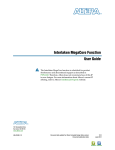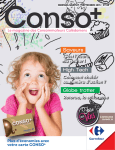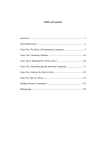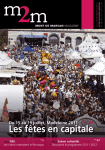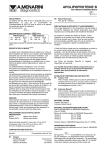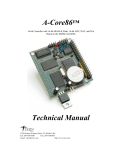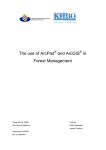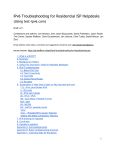Download UEL Library and Learning Service: Archives User Guide
Transcript
UEL Archives User Guide UEL Library and Learning Service: Archives User Guide Page 1 of 28 UEL Archives User Guide Table of Contents Table of Contents 02 Basic Information 04 Opening Hours Contact Details Admission Policy Photocopying Library Catalogues and OPACS 04 05 06 06 07 Introduction to the Archives Held 08 Refugee Archives 08 Refugee Council Archive at UEL Introduction How to Use UNHCR Thesaurus Location of Materials in the LLC Journals / Dissertations 08 08 09 11 12 16 UNHCR Audio-Visual Collections 16 Northern Refugee Centre Archive 17 Charter ’87 17 Diversity Art Forum AAVAA Online 18 19 East London Theatre Archive Project Project Background Hackney Empire Collection Lift 20 20 22 22 Additional Collections 23 Gender, Sexualities and Ethnic Studies Collection 23 Raphael Samuel Bequest 23 Eastside Community Heritage The East London Peoples Archive 23 25 Page 2 of 28 UEL Archives User Guide UEL Special Collection East London Local Studies Collection William Morris Dissertations / Theses 26 26 26 26 Copyright 27 Classification Schemes 28 Page 3 of 28 UEL Archives User Guide Basic Information Opening Hours The UEL Archives will normally be open and staffed at the times given below, but please contact the Archivist in advance if you are travelling from a distance, in case of change. Term Time: Monday: 9am – 6pm Tuesday: 10am – 7pm Wednesday: 9am – 6pm Thursday: 9am – 5pm Friday: 9am - 1pm Saturdays: Closed Sundays: Closed Vacations: Monday: 9am – 5pm Tuesday: 9am – 5pm Wednesday: 9am – 5pm Thursday: 9am – 5pm Friday: 9am – 5pm Saturday: Closed Sunday: Closed Page 4 of 28 UEL Archives User Guide Contact Details The UEL Archivist responsible for the Collections is Paul Dudman and his contact details are given below: Address: Mr. Paul V. Dudman BA (Hons.) MScEcon MCLIP Archivist UEL Archives Library and Learning Centre University of East London Docklands Campus 4-6 University Way London E12 6RD Telephone: Direct Line: 020 8223 7676 Mobile: 0795 7286623 Docklands Library Enquiry Desk: 020 8223 3434 E-mail: Archive E-mail: [email protected] Direct E-mail: [email protected] Docklands LRC Fax Number: 020 8223 7497 Additional Contacts Refugee Archives Web Site: http://www.uel.ac.uk/rca Refugee Archives Wiki: http://refugeearchives.wetpaint.com/ Refugee Archives Blog: http://refugee-archives.blogspot.com/ Page 5 of 28 UEL Archives User Guide Nadine’s International Development Wiki: http://intdev.wetpaint.com/ : East London Theatre Archive Contacts: Zoe Browne Philip Jones Project Manager Project Officer 020 8223 6462 020 8223 6462 [email protected] [email protected] Web Site: tbc Admission Policy All visitors are welcome, and although the collection is reference only, access to material is free of charge. The Archive is normally open on weekdays throughout the year at the times listed on above. Please notify the archivist in advance of your visit and let us know if you have specific requirements regarding access to archive materials and services. Contact the archivist, Paul Dudman, tel 020 8223 7676 (please leave a contact number if staff are unavailable). Email: [email protected] Photocopying Whilst the Refugee Council Archive Collection will all be held on a Reference Only basis, items will be made available for photocopying. The Archive itself has a black and white photocopier and the Docklands Library and Learning Centre contains both colour and black and white photocopies which are available for use. Photocopying requires a photocopier card which is available from the LLC and charges for black and white copying are 5p per A4 sheet and 7p per A3 sheet. Please remember that the photocopying of some items may be restricted by copyright or the intrinsic fragile nature of the material in question. Page 6 of 28 UEL Archives User Guide Library Catalogue and OPACS We are currently developing an online catalogue for all our Archival collections. This will involve an extensive process of retrospective cataloguing the entire Archive Collection. This project is currently ongoing and the latest additions can be found on the Library and Learning Services (LLS) online catalogue, called Talisprism, which can be found at: http://www.uel.ac.uk/lls There are networked PC’s available in the Archive for those with a UEL username and password. OPAC terminals linked to the online library catalogue are available nearby on the ground floor of the library building. Page 7 of 28 UEL Archives User Guide Introduction to the Archives Held The following archival collections are all held at our archival suite on the ground floor of the new Docklands Campus Library and Learning Centre. Classification schemes for all the Archives listed below are included at the end of this Guide. Refugee Archives. The UEL Archives now contain a number of archival collections associated with the study of refuges, asylum, forced migration and related issues. These Refugee Archives are a very important research tool in this field and the various collections that we hold will now be detailed below. Refugee Council Archive at UEL Web Address: http://www.uel.ac.uk/rca Introduction The Refugee Council Archive at the University of East London is one of the largest collections of materials relating to the study of forced migration and the refugee. It is a source of information and analysis on displacement, flight and exile; on legal, political and social issues; and on refugee community life. The Archive contains materials on refugees in all parts of the world, with special emphasis on Britain. It was first housed at the Refugee Council, the lead organization in Britain on refugee issues. For over 30 years the Refugee Council collected official and unofficial reports, books and journals, newsletters, conference proceedings, Page 8 of 28 UEL Archives User Guide research documents, field reports, informal data, and working papers. It also developed an extensive library of press cuttings. In 2002 the Archive was moved to the University of East London (UEL), where it is maintained and developed by the Refugee Research Centre. The Archive is open to all users. It serves students, academics, researchers, policy makers, agencies, and in particular refugees, for whom access to dedicated materials on forced migration is often difficult. The Archive is an inter-disciplinary collection. Materials held are relevant to research in refugee studies, demography and migration studies, and to politics, history, geography, law, legal studies, international relations, sociology, social welfare, ethnic and diasporic studies, psycho-social studies, community studies, and cultural studies. The University welcomes additions to the Archive, especially “grey” literature unofficial data, surveys and reports; unpublished documents and proceedings; and personal and community records and histories. Major sections of the Archive are organised under: Causes of Flight, Migration, Asylum, Assistance, Adaptation, Special Groups, and Organisations. Materials are also organised according to state of origin of refugees, and to policy and practice in regions or countries. Principal regions are: Central Asia, East Asia, South-East Asia, West Asia, South Asia, the Middle East, Africa, North Africa, East Africa, Southern Africa, Central Africa, West Africa, Europe, Americas, Caribbean, Latin America, and Oceania. How to Use The classification scheme used in The Refugee Council Archive at UEL has been devised by The Refugee Council in conjunction with the Refugee Studies Centre, based at Queen Elizabeth House at the University of Oxford. It has been devised in a Page 9 of 28 UEL Archives User Guide order to prove simple and straightforward access to information on refugees from a specific country or region. The classification scheme works as follows: • Each region of the world is located under a different letter of the alphabet, as listed in the box opposite. • Each country found within that region is defined by the addition of a further letter – for example, the classification for the United Kingdom would be Q (indicating it can be found in the region of Europe), followed by the letter U (which indicates the specific country, i.e United Kingdom). • These country specifications are then broken down further into, for example, Afghans living in the United Kingdom, which would be classified as FA/QU, where: F is South Asians A is Afghans Q is Europe U is the UK • After the letters, you will then find a number which relaters to the actual subject of the particular item in question. • A broad list of subjects is included on the following page. If you were specifically looking for Afghan refugee children living in the UK, you would look for FA/QU86.22, where: F is South Asians A is Afghans Q is Europe U is the UK and 86.22 is the number code for children. Page 10 of 28 UEL Archives User Guide • If you would like further information, then please contact the Archivist, Paul Dudman, on 020 8223 7676 or email [email protected]. * Guide adapted from an original produced by Mildred Hillcock of The Refugee Council’s Information Centre. UNHCR Thesaurus To help us catalogue the Refugee Council Archive at UEL, we use the UNHCR’s Refugee Thesaurus to provide subject terms when indexing individual items. These subject terms are the ones that you will need when you are undertaking a keyword search on our LRC online catalogue. The web address for the UNHCR Refugee Thesaurus is http://refugeethesaurus.org/ which will take you to the address listed below: You will be directed to the introductory page first which is listed below. To undertake a search of the Thesaurus, you will need to click on the Search option listed in the menu on the left of the screen: Page 11 of 28 UEL Archives User Guide Details of the Thesaurus Taken from the Website Itself: The International Thesaurus of Refugee Terminology (ITRT) is designed to facilitate information retrieval and exchange. In print since 1988, the Thesaurus has proven an essential resource for librarians and information workers. However, the specialized nature of and ongoing evolution in refugee terminology meant that the print editions were soon outdated. In 2002, the UN High Commissioner for Refugees Library and Forced Migration Online (FMO) began discussing how to create a web-based version of the Thesaurus that would be more responsive to the needs of its users. The Thesaurus is now available as an interactive and searchable tool online, in English, French and Spanish. We hope this new version will serve as a more efficient medium for identifying relevant indexing terminology and as a value-added mechanism for managing refugee- and forced migration-related information. Location of Materials in the LLC The Learning Resources Centres (LRC’s) at UEL use a system called Dewey Decimal Classification to catalogue and classify the materials held. This classification system is reflected in the class marks given to individual works and therefore the location on the shelves. Details of some of the more useful Dewey Decimal Classification class mark numbers are listed below. This represent a very basic guide and it is always worth checking the LRC online catalogue to check the exact location of the items you are looking for. General: Page 12 of 28 UEL Archives User Guide Refugees: Page 13 of 28 UEL Archives User Guide Migration: Page 14 of 28 UEL Archives User Guide Page 15 of 28 UEL Archives User Guide Journals / Dissertations There are a number of useful journals and dissertations relating to the field of Refugee Studies. The postgraduate MA Refugee Studies dissertations are now held in the Archive with the classification number MARefStud. These date from 1999 through to the current year. The following key refugee studies journals are subscribed too and available in the locations detailed below: Title Location Journal of Refugee Studies A30 REF (1988-1999) Docklands Library: 2003 - & Available Online International Journal of Refugee Law A44.2 INT (1989-1988) & Available at Duncan House Library Full Text and Online Refugee Survey Quarterly A30 REF (1994-1995; 1997-1999 and 2006 Onwards) Forced Migration Review A20.5 FOR Onwards) Refugees Magazine (UNHCR) A59.3 REF (1982 Onwards) International Migration Review A30 IMR (2006 Onwards) (Vol. 1 1998 UNHCR Audio Visual Collections Web Address: http://www.unhcr.org.uk/ During 2006, and in conjunction with the Refugee Council Archive at UEL, we were able to secure a very large donation of resources from the London Office of the Page 16 of 28 UEL Archives User Guide United Nations High Commission for Refugees, (UNHCR). This donation includes the UNHCR Slide and Photographic Library which incorporates over thirty boxes of slides and photographs produced by the UNHCR over a number of years. In addition to this vastly important collection of images, we have also received the donation of a large selection of Videos and DVD from the UNHCR Audio-Visual Archive. These items can be made available on loan as part of the donation agreement with UNHCR. Please refer to the Archivist, Paul Dudman in the first instance. Northern Refugee Centre Archive - Web Address: http://www.nrcentre.org.uk/about.htm In January 2007, we were very please to accept the donation of the Northern Refugee Centre Archive collection to our archival collections here at UEL. The Northern Refugee Centre, or NRC for short, was established during 1983 and is now based in Sheffield. The NRC is a registered charity supporting the integration of refugees and asylum seekers. In addition, the NRC exists to promote the welfare of all refugees and asylum seekers within the Yorkshire and Humber region. We were very pleased to reach an agreement whereby we could develop and maintain the NRC Archive as part of our commitment to developing a significant resource for the study of forced migration and the refugee. The collection is now available to browse on the shelves of the Archive room but will need to be re-catalogued in due course. Charter ’87 This collection has only just arrived with us (end of July 2007). Further details will follow in due course. Page 17 of 28 UEL Archives User Guide Diversity Art Forum Web Address: http://www.untoldlondon.org.uk/museum/AM29639.html Introduction The Diversity Art Forum collection (formerly known as the African and Asian Visual Artist’s Archive, or AAVAA), moved to the Archive suite in the Library and Learning Centre during August 2004. Diversity Art Forum represents an important collection of slides, catalogues, videos, papers and ephemera relating to the work of artists of Afro-Caribbean or Asian origin living and working with the UK. It represents a living archive which has been utilised for a number of various projects by both researchers and students. General Background Information Firstly, it is easy to assume that 'diversity' automatically will include every ethnic identity, secondly there is the assumption that it is linked to capitalism construction of diversity. Diversity Art Forum takes these considerations on board but aims to consider other ways that 'diversity' is constructed and used beyond the two points just mentioned. Think of diversity as a deformalisation of rigid criteria reduced to a succession and simultaneity. The archive element is one aspect of Diversity Art Forum. The organisation sees itself more as an active collaborator. Diversity Art Forum has inherited archive material of Black, African and Asian artists living in Britain. To enhance that material the archive has now included new material from artists out side Britain and Western Europe. Diversity Art Forum have new material from artists working in sound art, internet as well other visual mediums. Founded by artist and curator Eddie Chambers in 1989, Aavaa was originally an independent arts organisation based in Bristol. In 1995, the archive relocated to the University of East London (UEL) and is now housed at the newly built Docklands Campus in the School of Art and Visual Theory. Page 18 of 28 UEL Archives User Guide Scholarly research about artists, art forms and critical discourse is at the heart of Diversity Art Forum's objectives. In this sense the archive occupies a unique position, in that a dynamic and continuous relationship with its Contributors (artists, curators and writers) is needed for Diversity Art Forum's very existence. This relationship brings meaning to calling Diversity Art Forum a 'living' archive, evaluating 'live' documents. AAVAA Online: http://www.aavaa.org.uk/ In 2006, the AAVAA Online Project was launched providing online access to key artist information and works held within the DAF collections. This site has been designed as an easy-to-navigate archive of African and Asian visual arts in Britain and contains over 3000 images and information about concerning 200 artists. AAVAA Online is a comprehensive resource for students, historians, artists and museum practitioners alike African and Asian visual artists have made an extraordinary contribution to the cultural heritage of Britain over hundreds of years. In the last 10 to 15 years at least, this has been reflected in the international success of artists such as Chris Ofili, Anish Kapoor and Yinka Shonibare, whose work is inspirational to many. The work of artists such as Donald Rodney, Sonia Boyce, Rasheed Araeen and Keith Piper, who pre-date the current generation, provide the strong foundations for the current high profile successes. Discovering the long and distinguished black visual heritage in Britain can provide a deeper sense of belonging for black and Asian Britons, as well as giving the wider British public a more faithful and full account of our shared cultural heritage. Page 19 of 28 UEL Archives User Guide East London Theatre Archive Project Web Address: http://www.jisc.ac.uk/whatwedo/programmes/programme_digitisation/theatre.aspx Project Background The East London Theatre Archive will create an invaluable database of performing arts resources, from playbills and programmes to press cuttings and photographs. By creating around 15,000 digital objects, taken from East London theatres, the project will preserve unique endangered collections and make them accessible to an academic audience. The outcome will be a digitised collection full of rich potential for students and researchers across the country. East London has made a unique contribution to the development of theatre and theatre studies - it was the East End of London that first brought musical hall and variety to the world which grew into vaudeville and burlesque with their multifarious European and American incarnations. These theatrical forms later evolved into what became known as the ‘alternative comedy’ of the 1980s. During the late 19th and early 20th century, East London had more music hall theatres than any other part of the country. Many of these buildings were bombed in the war, were cleared away for the onset of social housing, became cinemas or fell into disrepair. From the ashes of its past, from its many forgotten lost theatres, a diverse and dynamic resource remains. Page 20 of 28 UEL Archives User Guide This project will celebrate and facilitate research into East London theatres and their history by making the precious archives of these buildings available to researchers and students with an academic interest in charting the influence and power of the area’s contribution to theatre today. The history of theatre in the East End has been a comparatively under-researched subject area, partly due to the inaccessibility of primary research materials. Overshadowed by the focus on the West End theatre, the theatre of the East End offers rich potential for researchers. This resource will address the lack of digital resources available in the performing arts sector. The Content Creating around 15,000 digital objects, the resource will mainly comprise images and papers, but also photographs, artifacts and media clips. It will be sourced from: Theatre Museum: c10,000 items, including rare 19th century playbills, modern programmes, contemporary press cuttings, prints, posters and architects' plans. Web: http://www.vam.ac.uk/tco/ Lift Living Archive: more than 300 boxes of documents, 4,000 photographs, 100 Festival programmes and leaflets, 700 hours of video documentation and 60 hours of audio recordings. Web: http://www.liftfest.org.uk/ Theatre Royal Stratford East: includes important collections of Joan Littlewood's letters as well as material on the emergence of the black musical. Web: http://www.stratfordeast.com/ Hoxton Hall: includes photographs, Victorian ephemera and architectural items from the late 1800s to the present day. Web: http://www.hoxtonhall.co.uk/ Wilton 's Music Hall: photos and papers from mainly modern performances. Web: http://www.wiltons.org.uk/ Page 21 of 28 UEL Archives User Guide Half Moon Young People's Theatre: an archive collection of papers which tell the story of the rise of bilingual theatre within East London's transient immigrant populations. Web: http://www.halfmoon.org.uk/ Hackney Empire: an archive which charts the theatre's history through its music hall heyday to its demise and then resurgence. Web: http://www.hackneyempire.co.uk/ Hackney Empire Archive Web Address: http://www.hackneyempire.co.uk/ The Archive collection of the Hackney Empire collection arrived at UEL during the Spring of 2007. The collection contains a broad range of materials included posters, playbills, audio-visual materials and ephemera relating to the History of the hackney Empire Theatre. The archive collection itself is still being sorted and made ready for cataloguing so please contact us with any enquiries and we will be happy to help. Lift Web Address: http://www.liftfest.org.uk/ The London International Festival of Theatre (Lift) archive collection may be coming to UEL during 2008 as part of our East London Theatre Archive project. Further details will be added here in due course. Page 22 of 28 UEL Archives User Guide Additional Collections Gender, Sexualities and Ethnic Studies Collection Web Address: http://www.uel.ac.uk/rca/othersites.htm#Gender With the advent of the UEL postgraduate MA degree course in Gender, Sexualities and Ethnic Studies, the UEL Archives were pleased to receive a large donation of materials pertaining to this particular course. The donations contains a diverse range of materials which will be catalogued onto the UEL Talis Library Management System and hence to be available to search via our online catalogue. A classification scheme has now been agreed for this collection and cataloguing of this collection should hopefully begin in the near future. The collection also now holds past dissertations related to the MA degree course and these are available on request. The relevant code to look for on the Catalogue will be MAGenSexEth. Raphael Samuel Bequest The Raphael Samuel Book Collection is currently being housed in the Archive room whilst it is being catalogued and made available to library users. The collection arrived c. 1997 as a bequest after the death of Raphael Samuels. All books in this collection will be given the prefix RaphSam followed by the existing Dewey Decimal Classification Number as used in the main UEL libraries. These books will normally be made available in the main Docklands Library although any rare or fragile books will be kept in the Archive for safe keeping. Please enquire for further information. Eastside Community Heritage Web Address: http://www.hidden-histories.org/ Background Eastside Community Heritage (ECH) was founded in 1993 and became a charitable organisation during 1997. ECH places a strong emphasis on local and community Page 23 of 28 UEL Archives User Guide history and this has included the development of a number of projects endeavouring to preserve and document the lives of `ordinary’ people from and who are living and working in East London. Eastside projects to date have included: Working Lives of the Thames Gateway - To record and preserve people's stories and experiences of working in the many industries that made East London Britain's gateway to the world. Web: http://www.hiddenhistories.org/Projects/Working%20lives/home.htm My Roots, Our Heritage - A film project documenting and researching the experiences that effected people from the African/Caribbean communities. Web: http://www.hidden-histories.org/Projects/My%20roots/index_roots.htm Trendsetters - Black fashion and history project involving teenage girls from schools in Newham. Involved costume design, history trips, auditions and a fashion show. Web: http://www.hidden-histories.org/Esch_pages/Trednsetters_link.html Our Brick Lane - Recording oral histories from present and past communities of Brick Lane and make video documentary. Web: http://www.hidden- histories.org/Projects/Brick%20Lane/Home_brick.htm Chinese Lives - Chinese Lives is the story of Newham Chinese residents, their history, their experiences and their contribution to Newham culture. Web: http://www.hidden-histories.org/Esch_pages/Chinese_link.html Bridging the Gap - Oral history and multimedia project based on the Aberfeldy Estate in East London. Web: http://www.hidden-histories.org/Esch_pages/Bridge_link.html The aim of ECH is to record, archive, and preserve for the public good, the cultures and heritage of many of the diverse communities located on East London. In 1999, Page 24 of 28 UEL Archives User Guide ECH established their East London People’s Archive, which now contains in excess of one thousand oral histories and many thousands of photographs and video materials. The East London People’s Archive - Digital Archive In July 2007, UEL were very grateful to receive an electronic copy of the East London People’s Archive produced by Eastside Community Heritage. The Archive will be made available from early August 2007 and the collection itself is entirely digital in nature. Many of the oral histories and associated transcripts are made available on this digital archive. We also have a selection of folders that contain copies of the number of images that have been collected by ECH in the process of developing their various projects. If you wish to access and search the Eastside Archive then please contact a member of Archives staff who will be more than happy to assist you. If you have any queries relating to Copyright or obtaining Digital Copies of any of the Eastside Archive resources, the you will need to contact Eastside directly as they retain full copyright control over the materials. Their contact details are: Eastside Community Heritage Unit 8 44 Gillender Street London E14 6RP Telephone: 020 7538 4545/338 Email: [email protected] Page 25 of 28 UEL Archives User Guide Special Collections Web Address: tbc East London Local Studies Collection Web Address: tbc This is a new collection which has been started in the Summer of 2007 to develop an archival collection relating to the history of the local East London region charting its history and development over time. The collection is still in its very early stages and will be developed over time. Further information will appear hear as the collection develops. William Morris We do also hold a small collection related to the artist and designer William Morris. This has been with the University since the early Twentieth Century when it was originally called the Waltham Forest College of Art. Dissertations and Thesis The Archive room now contains an extensive run of UEL PhD and M.Phil research thesis. As with the remainder of the Archival collections, these are reference only and cannot be taken out of the Archive room. We now only hold postgraduate level thesis relating to the specific MA postgraduate courses in Refugee Studies and Gender, Sexualities and Ethnic Studies. Most masters level dissertations are now held in storage with a selection also available at the main Docklands library enquiry desk. Please contact 020 8223 3434 for further information. Page 26 of 28 UEL Archives User Guide Copyright Please refer to the Library’s comprehensive guides to Copyright for full background information. These guides can be found on the web site at: http://www.uel.ac.uk/lss/copyright_new.htm Photocopying and Copyright Restrictions: Copyright legislation as defined in the Copyright, Designs and Patents Act 1988 places strict legal restrictions on what researchers and students can copy for educational or personal use. These rules applying to the photocopying of Archival materials can be complex so please be careful when copying. Consequently, please try and follow the guidelines listed below when photocopying materials from the Archive and please consult the Archivist if you are uncertain of how to proceed. The following guidelines have been prepared by the Copyright Licensing Agency or CLA and a fuller description can be found in the LSS Student Guide to Copyright (http://www.uel.ac.uk/lss/copyright/copyright-students_new.htm) : • Books – Permitted to copy one complete chapter or extract(s) totalling no more than 5% of the book, whichever is greater. • Journals – From a single journal issue, you or permitted to copy one whole article. • Conference proceedings – It is possible to photocopy one whole paper from the set of conference proceedings*, totally no more than 5% of the set, whichever is the greater. • Photographs – Low resolution copies for research or private study marked/defaced to indicate they are not identical and for academic use. Permission should be sought for on all other occasions. • MA Refugee Studies' Dissertations and Theses – No photocopying permitted. • Article Offprints - No Photocopying Allowed Page 27 of 28 UEL Archives User Guide Further information can be found by referring to UEL's online Copyright Guides and by referring to the web site of the Copyright Licensing Agency, (CLA). The CLA has also produced a set of User Guidelines which are available from the CLA website. Classification Schemes The classification schemes for all the main Archival collections listed above will be made available in the pages that follow. Please enquire with a member of Archives staff if there is anything here that you would like clarification on. Page 28 of 28





























